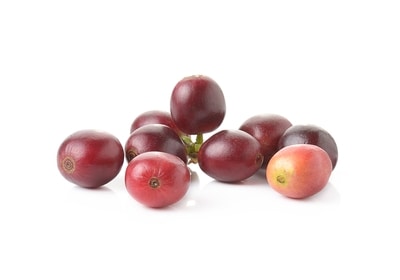Why Is My French Press Coffee Weak? (5 Causes & Fixes)
Loved for the unique coffee that it can produce, the French press is one of the most iconic coffee makers in the world. But why is it that your French press coffee sometimes tastes weak?
The reason French press coffee tastes weak is due to several factors such as not using enough coffee, not steeping the coffee for long enough, water temperature is not hot enough, coffee is ground too coarse, or the coffee is a light roast. Making one or more of these changes will result in stronger French press coffee.
No one wants to drink weak French press coffee, so let me take you through the steps to make your French press coffee stronger.
How to make your French press coffee stronger
Your French press coffee may taste weak due to one or several factors, which we’re now going to look at.

1. Use more coffee

One of the most common mistakes that people make when preparing coffee is not adding enough ground coffee to the French press.
This is mainly due to the fact that most people dose with a spoon, which makes it very difficult to know exactly the quantity of coffee you’re using. Dosing with a spoon also makes it difficult to repeat with accuracy time after time.
When using a French press, the ideal ratio for most coffee drinkers is one part coffee per 14 parts water. In other words, that’s 70 grams of coffee per 1 litre of water (2.5oz per 34fl oz).
A typical heaped tablespoon of coarsely ground coffee suitable for French press weighs around 11g. However, just one gram’s difference per spoon could leave your coffee tasting considerably weaker than you would like. Add to this that you may be adding too much water, and you can see why your coffee is weak.
The most sure-fire way to dosing the correct amount of coffee and water is to use a digital scale. While this might seem like hard work and a little obsessive, you’ll be surprised at how little effort it takes once you do it a few times.
Place your French press on the scale and tare it. Add the appropriate amount of coffee, then add water using the 1:14 ratio.
If you can’t use a scale, my best advice is to use the same dedicated dosing tool each time you make coffee.
The ideal tool is a scoop that you can level off. This will help you dose with greater accuracy.
2. Increase brew time

The amount of time that you brew your coffee plays a huge part in the final taste and strength. Coffee ground for a French press is generally coarser, which means you need to brew it longer before plunging.
French press coffee needs to steep for a minimum of four minutes in order to extract the flavours and have a desirable brew strength.
Plunging the filter pretty much puts a stop to the brewing process. Whilst you’ll get an acceptable cup of coffee plunging at the four-minute mark, you might want to try leaving it a bit longer.
The coffee grounds will form a layer at the top of your French press, known as the ‘crust’.
If you want to brew for longer, give the crust two or three stirs at the four-minute mark and allow the grounds to float to the bottom of the press. At this point, you can actually leave the coffee to brew for up to a further 10 minutes.
Generally, store-bought coffee is darkly roasted. The darker the coffee, the shorter the brew time, so make sure to check the packet to know the roast level of your coffee. If it’s a particularly dark roast, only brew for a couple more minutes.
Whilst the extra wait might seem frustrating, the coffee is way too hot to drink after four minutes anyway. This way, you get a stronger cup that is ready to drink the moment you pour it into your cup.
3. Increase water temperature

Another important factor when making strong French press coffee is to ensure that the water is at the desirable temperature.
The lighter the roast, the hotter you need the water to be in order to fully extract all the wonderful flavours. Using water that is too cool results in sour, under-extracted (under-cooked) coffee. The coffee will also lack body, causing it to be weak and watery.
The ideal coffee-brewing temperatures are between 94 – 98°C (200 – 208°F). If you don’t have a programmable kettle that you can set to a specific temperature, then allow your water to cool for up to 90 seconds after it has come to a boil. This ensures that the water is at the correct temperature for making delicious French press coffee.
To keep everything nice and toasty, preheat your French press with hot water. This helps the coffee brew more efficiently. Plus, it keeps your coffee hotter for longer after plunging. It’s a win-win!
4. Don’t grind too coarse

This isn’t likely to be an issue unless you grind your own coffee beans. This is because coffee that has been pre-ground for French press will be some of the coarsest coffee you can buy from the store.
Any other grind type would result in your coffee being harshly strong and bitter because it has been ground too fine.
If you grind your coffee too coarsely, the water isn’t able to brew the coffee grounds properly, resulting in a weak cup of coffee.
If you take a look around the Internet, you’ll often see advice given to grind your coffee very coarse, with some pictures look more like shards than grounds.
The reason for very coarsely ground coffee producing weak coffee is simple to explain. If you were to boil a large potato chopped into 100 pieces, it would cook in a matter of minutes.
However, if you boil that same potato cut into only four pieces for the same amount of time, you will end up with an undercooked and inedible potato.
This is why grind size plays a huge role in determining the strength of your coffee. For those that grind their own coffee, keep grinding slightly finer until the coffee has a good body and isn’t watery.
5. Choose the right roast level for your tastes

For many people around the world, the sign of a nice, strong cup of coffee is one that has dark, caramelised, roasty notes which produce a very bold cup with a heavy body.
If that’s the case, then you’ll need to look for darkly roasted beans to satisfy your coffee kick.
The variety of coffee used also contributes to how some people perceive coffee strength. Over 98 percent of coffee worldwide comes from just two varieties of coffee beans: arabica and robusta.
Coffee lovers often consider arabica superior in taste to robusta. However, those seeking a highly caffeinated cup of joe often find robusta’s flavor a winner.
Next time you’re at the store, check the roast level on the packet. Look for packs that don’t specify 100 percent arabica.

Enjoying perfectly-brewed, piping hot French press coffee is something close to every coffee lover’s heart. Its simplicity and unique qualities are why it’s enjoyed the world over.
If you’re looking to up your French press game, look no further than the Espro press. The vacuum insulated double walls maintain stable temperature during the brewing process, ensuring the perfectly brewed cup.
What’s more, the double walls also keep the brewed coffee hot for hours, which is something every French press user struggles with.
The Espro press features two filters. These filters retain the heavy body while significantly reducing the amount of ground coffee sediment at the bottom of your cup.
Last but not least, I love that the Espro press is made from stainless steel.
Unlike most French presses which are made from glass and highly prone to shattering, the Espro is unbreakable.
You never have to worry about it falling over in the dishwasher or slipping out your hands when washing up. This thing is going to last you a lifetime, so do your coffee a favour and make sure to check out the Espro press on Amazon.







